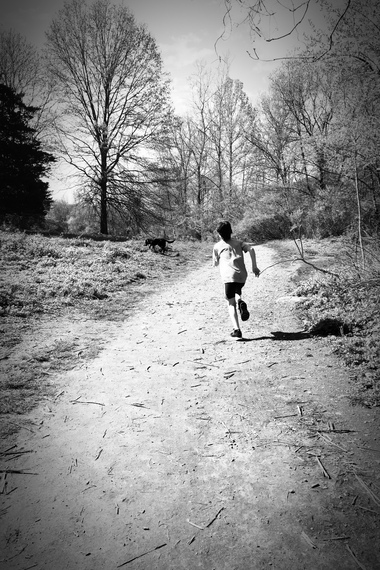It seemed that he was barely in the room, as if he'd traveled somewhere else, but I watched his arms twisting around legs, in a corner of his rumpled bed. His furrowed brows covered downward-pointing deep blue ponds that I could've drowned in if I'd followed. His 10-year-old bones caved inward beneath a royal blue athletic shirt-- the remaining brightness of boyhood. His breath purred shallow exhales disinterested in words.
"Want to play a game? Want to come downstairs and make cookies? Can I read to you?"
Silence.
"Leave. I don't want to do anything." His only interest had dwindled to Minecraft video games. My boy, a foreigner.
I wanted to dig through his layers of depression to rescue the sparkling, talkative, hyperactive, strong boy who'd fallen into the complicated burdens of life: heart surgery; an arrhythmia; siblings born quickly after him; sensory processing disorder leading to isolation and tantrums; social skills challenges; therapists; psychiatrists; medications; countless teachers pointing to what he'd done wrong, again. He'd fallen through a cyclone of years and I'd gone whirling after trying to grab the right help, dodging naysayers and judges, seeking a place where I could again embrace the gorgeous child beneath the turmoil.
And there we sat, everything quiet and dim in his room decorated in swim trophies, a handmade striped blanket, a bookcase full of Harry Potter dreams. Depression left us in a deserted land where experts flung hands in the air from distant offices, where nobody knew how to crack the gate of a locked-up child's mind.
"I can't be around people anymore," he said. "They hurt too much." Months passed. Doctors threw countless speculative diagnosis at him, adding to the confusion. The public school went quiet. "Experts" conflicted with each other and advised solutions that no parent wants to hear. Send him to a boarding school, to a hospital. Medicate him, heavily, and don't worry about the side effects. Leave him in a facility with scream rooms for isolating anxiety-ridden boys who become upset by unrealistic expectations.
But this story is about the light that was waiting around the corner where my depressed child and I sat. I wish I'd known. At least one hopeful story about escaping childhood depression would've helped. But we clunked along the bottom of his room, wondering where to go before we found a plateau. We had to turn from the damming advice and fear that was getting us nowhere. We had to leap to something better, to take new risks, and to trust our instincts as his parents.
We urged him to go with us somewhere, anywhere, to get away. "Can we go back home to California?" he responded. We quickly booked a trip back to Marin County.
After arriving, he got the stomach flu, so he couldn't take his medications. A day later, his eyes brightened and his body moved more fluidly. He asked to go outdoors. "Can we get a burrito? Meet some people?" he said. We kept him off the meds (that hadn't been helping him as far as we could tell) and throughout the following weeks his energy increased almost daily.
We visited old California friends. A young girl from our church was excited to spend time with him. She hiked with us all day. His old teachers visited him, and he sat with them chatting. We saw how loving people, outside our immediate family, could bring him back. We caught site of the child we'd lost, and it fueled our hope.
After returning to our Connecticut home, we employed what we'd learned on our trip by requiring him to engage in activities out of the house in order to earn limited video game time -- screens, though they were his only remaining interest, were partially responsible for encouraging his isolation. Long days of anger and tears ensued. "Minecraft is my community, Mom!" but gradually he emerged from his quiet world.
We called old friends and new ones who enjoyed his company, asking for their help. He continued to brighten.
We created a school for him with specialists he responded to, and we said goodbye to the ones who weren't helping. One teacher sat outside his room daily until he was willing to learn. One therapist wandered around our house with him chatting. One drum teacher helped him rediscover a beat and a love for music. One tae kon do blackbelt taught him how to use his energy, his strength. One speech therapist talked with him about all of his interests and fears. One occupational therapist let him fling his body through giant spaces until he began to feel himself again. He listened. He learned. He laughed.
And finally we gave thanks for every ounce of him that emerged. Hyperactive? No problem. Too talkative? We'll take it. Difficulty following through? We can work on that. Problems reading social cues? I know countless teachers, adults and therapists with those problems. Our boy will survive.
Today my son is hopeful about his future. "I want to help people," he says. His smile is a horizon of gold-- a good story for other kids who suffer. It's one for me to keep, to unfold, and to relearn when we meet our next difficult time.
I've become a different mom by witnessing the mystery, complexity and seismic hope in my child's future. I've felt how my strength and my belief in my child helps provide fuel for his flourishing.
I've reveled at the way life presents each of us with a "ground zero" every time we inhale.
